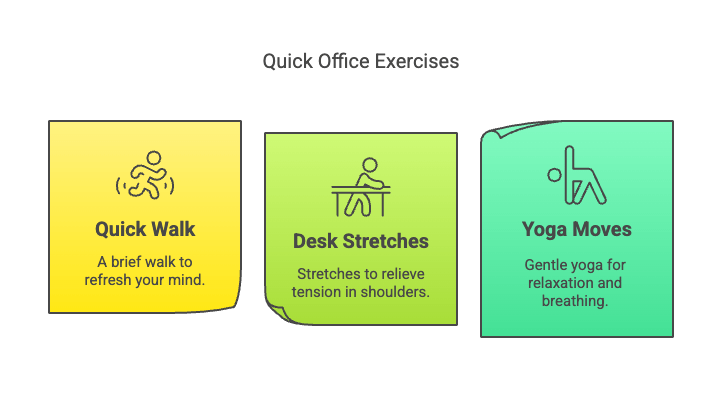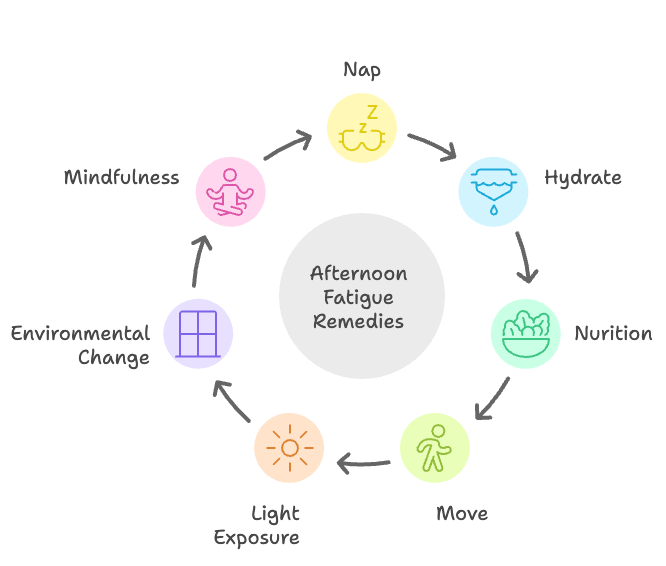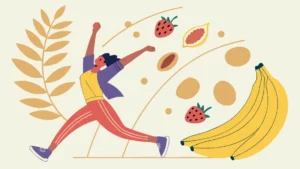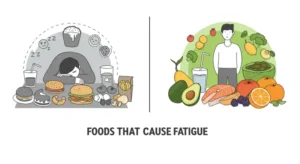Table of Contents
Do you want to reduce afternoon fatigue without drinking more coffee? Many people feel this way. I used to fall asleep in meetings and always needed a lot of coffee. I tried many energy drinks, pills, and strange ideas to be more productive. But I finally found things that really work.
The afternoon slump is not just in your mind. It’s a natural thing that happens in your body. But, drinking more caffeine is not the answer. I have tried many ways to stop afternoon tiredness. These seven ideas are proven by science and they actually help.
Why You Feel Tired in the Afternoon
Let’s figure out why you get tired in the afternoon before we talk about how to fix it.
Your afternoon tiredness is mostly because of your body’s natural rhythms. The amount of cortisol in your body (the hormone that keeps you awake) goes down in the afternoon, usually between 1 PM and 3 PM. This happens no matter how much you did in the morning or how much sleep you had. It’s part of your body’s internal clock, called your circadian rhythm.
Another reason is a chemical called adenosine. It helps you sleep and builds up during the day. Caffeine can stop adenosine from working for a while, but when the caffeine wears off, the built-up adenosine can suddenly make you feel very tired.
What you ate for lunch matters too. That sandwich from the cafe? If it has a lot of white bread and sugar, your blood sugar will go up and down quickly. This can make you feel tired and want more food.
Being dehydrated can also make you tired. Studies show that even a little bit of dehydration can make you less alert and more tired. Your body needs water to work well, including carrying nutrients and oxygen that give you energy and help your brain work.
Here are some things that can help:
1. Take a 30-minute nap
People often laugh when I say napping helps me get more done. But there’s real science behind it.
Clinical studies show that strategic naps ranging from 10-60 minutes can improve mood and reduce sleepiness for up to 4 hours afterward. The magic number? 30 minutes.
Studies show that short naps, from 10 to 60 minutes, can make you feel better and less tired for up to 4 hours. The best nap length? About 30 minutes.
A 30-minute nap helps you remember things better than not napping. It also makes you feel more awake. It’s the perfect length – not too long, so you don’t feel sleepy after, but long enough to help you.
Can’t nap for 30 minutes? Even a short 5-10 minute nap can help. Just set an alarm, find a quiet place, and take a quick rest.
2. Change What You Eat for Lunch
I used to eat whatever was easy for lunch. Then, I’d feel super tired at 3 PM. That was a bad idea.
What you eat for lunch really affects how much energy you have. Eating real foods, good protein, and healthy fats helps keep your blood sugar steady all day. This stops you from crashing, which can happen when you eat too many processed carbs and sugars.
Here’s what works for me:
- Eat protein, healthy fats, and carbs that take a while to digest. For example, chicken with avocado on whole-wheat bread.
- Don’t drink sugary drinks like soda. They might seem to give you energy, but you’ll feel tired later.
- Instead of sugary snacks, eat things like plain yogurt with berries or nuts.
If you need a boost in the afternoon, try black coffee, unsweetened iced tea, or a small piece of dark chocolate. They give you energy without making you crash.
3. Drink Water: The Easy Fix You Might Be Missing
I used to feel really tired in the afternoon. Then I noticed I wasn’t drinking much water between my morning coffee and dinner. Here’s a tip: Proper hydration can really boost your energy.
Studies show that drinking enough water is important for your brain and energy. Water helps move nutrients and oxygen to your cells. It also helps your blood pressure and heart work well. If you’re not drinking enough water, your pee might be dark, and you might feel thirsty. These are signs you might get tired.
Here’s what I do: I keep a water bottle at my desk and try to fill it up at least twice before 3 PM. If plain water is boring, add cucumber, lemon, or berries. But don’t add sugary stuff.
4. Quick Exercises to Feel Better
When you start to feel tired in the afternoon, you probably don’t want to move. But that’s what you should do.
Doing a little exercise can help you feel less tired. It gets your blood flowing and sends more oxygen to your brain and muscles. This gives you energy right away and helps you think more clearly.
Here’s what I do:
- Walk for 5 minutes. You can walk around the office or use the stairs.
- Easy stretches you can do at your desk to help with stiff shoulders and hips.
- Do some easy yoga poses and breathe deeply.

Doing these things helps your blood flow better and eases the stress from sitting still. Moving and breathing carefully at the same time wakes up a part of your body that helps you relax and stay alert, instead of feeling tired.
5. Let the Light In: How Light Wakes You Up
I used to have afternoon fatigue. Then I realized I felt worse on cloudy days or in rooms without windows.
Light helps you stay awake because it controls your body clock. Studies show that bright light, like sunlight, tells your brain to be alert. If you’re tired in the afternoon, open the blinds or go outside. This can give you more energy. If there’s no sunlight, a special lamp can help.
Here’s what I do: I try to work near a window. If I can’t, I take a short break outside when I feel tired. Or, I use a small light therapy lamp at my desk.
6. Change Your Surroundings: Feel More Awake
Sometimes beating afternoon fatigue is about changing your environment to snap your brain out of an energy slump.
Studies with people who have long-term health problems showed that using things that affect your senses, like using essential oils (especially citrus smells), can give your brain a new boost and make you feel more awake for a little while.
Here’s what helps me:
- Working in a different place (moving from desk to a different space)
- Try using citrus essential oils, like orange or lemon.
- Listen to happy music for 5 to 10 minutes.
- Put cold water on my face.
These changes in your surroundings can wake up your brain and make you feel more alert for a little while.
7. Pay Attention: Teach Your Brain to Fight Tiredness
I didn’t believe this at first, but it works if you do it regularly. Mindfulness exercises can really help your body deal with being tired.
A brain study showed that mindfulness can lessen the bad effects of tiredness on your feelings and brain activity. In the study, people who were tired but did mindfulness exercises still reacted to emotional things, unlike those who didn’t do the exercises.
How I do it:
- Do some deep breathing for 3-5 minutes when you feel tired.
- Use apps that guide you through meditation to help with energy and focus.
- Take planned breaks before you get too tired.
Instead of working when you’re tired, take short breaks to help your brain. Doctors suggest taking short breaks often during the day, instead of waiting until you’re very tired.
How to Stop Feeling Tired in the Afternoon

I’ve tried different things, and l’ve learned that using a few of these ideas together works best. My favorite mix is drinking enough water, eating a lunch with protein, and taking a short walk outside in the sun.
The secret is to work with your body’s natural clock, not against it. Caffeine can’t beat your body’s basic needs. But these methods, which are supported by science, can help you have steady energy all day. Use these afternoon tips with morning routines that give you energy, so you can start your day strong.





